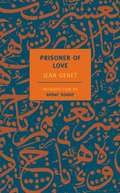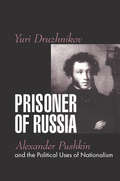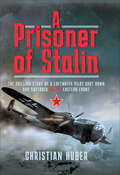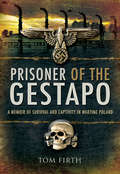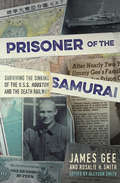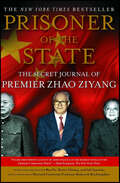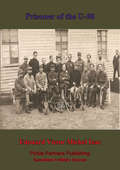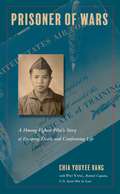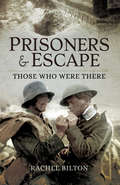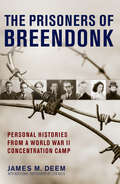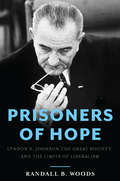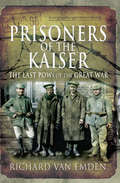- Table View
- List View
Prisoner in the Kitchen: The Car Thief, the Murderer, and the Man Hired to Feed Them
by William BonhamWinner of Simon & Schuster's memoir contest in conjunction with AARP and the Huffington Post, the memoir of a man's coming-of-age as a civilian cook in a maximum-security prison.In 1973, recent Montana transplant William Bonham desperately needs a job. Hoping to take advantage of his background working in restaurants and diners, he finally comes across a listing for a position offering great money and benefits--at Montana State Prison in Deer Lodge. He takes it. As food service supervisor in the kitchen of the maximum-security prison, Bonham oversees a kitchen crew of convicts that prepares and serves each meal. Among his staff are Earl, a homely baker; Aldrich, a timid young dishwasher; Smoky Boy, the prison's most feared and respected convict; Mackey, who claims to have cooked at Seattle's Olympic Hotel in his pre-incarceration life; and Reed, a cook whose calm, witty demeanor wins over Bonham. Over the next year, Bonham comes to care for his crew. Although he knows that these men have committed unforgiveable crimes, Bonham forms a camaraderie with them that borders on friendship--until a late-night incident calls his judgment into question. Told with humor and empathy, A Prisoner in the Kitchen is the redemptive tale of Bonham's transformation from a bright-eyed optimist who sees the good in everyone to a man who understands and revels in the complexities of human nature.
Prisoner of Love
by Jean GenetStarting in 1970, Jean Genet—petty thief, prostitute, modernist master—spent two years in the Palestinian refugee camps in Jordan. Always an outcast himself, Genet was drawn to this displaced people, an attraction that was to prove as complicated for him as it was enduring. Prisoner of Love, written some ten years later, when many of the men Genet had known had been killed, and he himself was dying, is a beautifully observed description of that time and those men as well as a reaffirmation of the author's commitment not only to the Palestinian revolution but to rebellion itself. For Genet's most overtly political book is also his most personal—the last step in the unrepentantly sacrilegious pilgrimage first recorded in The Thief's Journal, and a searching meditation, packed with visions, ruses, and contradictions, on such life-and-death issues as the politics of the image and the seductive and treacherous character of identity. Genet's final masterpiece is a lyrical and philosophical voyage to the bloody intersection of oppression, terror, and desire at the heart of the contemporary world.
Prisoner of Love
by Jean Genet Barbara Bray Ahdaf SoueifStarting in 1970, Jean Genet--petty thief, prostitute, modernist master--spent two years in the Palestinian refugee camps in Jordan. Always an outcast himself, Genet was drawn to this displaced people, an attraction that was to prove as complicated for him as it was enduring. Prisoner of Love, written some ten years later, when many of the men Genet had known had been killed, and he himself was dying, is a beautifully observed description of that time and those men as well as a reaffirmation of the author's commitment not only to the Palestinian revolution but to rebellion itself. For Genet's most overtly political book is also his most personal--the last step in the unrepentantly sacrilegious pilgrimage first recorded in The Thief's Journal, and a searching meditation, packed with visions, ruses, and contradictions, on such life-and-death issues as the politics of the image and the seductive and treacherous character of identity. Genet's final masterpiece is a lyrical and philosophical voyage to the bloody intersection of oppression, terror, and desire at the heart of the contemporary world.
Prisoner of Russia: Alexander Pushkin and the Political Uses of Nationalism
by Yuri DruzhnikovAs the central figure in Russian literature, Alexander Pushkin (1799u1837) has been claimed by nearly every political faction, right and left, in Russian cultural politics over the past two centuries, culminating in his official canonization under the Soviet regime. In Prisoner of Russia, Yuri Druzhnikov analyzes the distortions and misrepresentations of Pushkin's cultural appropriation by focusing on Pushkin's attempts at emigration and his attitudes toward Russia and Western Europe.Druzhnikov's semi-biographical narrative concentrates on Pushkin's attempts to leave Russia after his graduation from the Lyceum, through his period of exile, until his early death in a duel in 1837. The matter of emigration from Russia was a politically charged issue well before 1917; witness the hostile reception of all of Turgenev's novels from Fathers and Sons on. The emigrU artist's cultural context is often used to assess his authenticity and stature as seen in the Western examples of Henry James, T.S. Eliot, or James Joyce. Druzhnikov sharply criticizes the omnipresent and reductive tendency in Russia (and the West) to define Russian cultural figures in terms of absolute essences and ideologies and to ignore the ambivalences that in fact help to define a writer's singularity. In the larger view, he argues, it is these that explain the variety and complexity of Russian culture.Druzhnikov's multidisciplinary approach combines literary and political history, with critical commentary arranged in chronological sequence. His interpretive apparatus ranges widely through nineteenth- and twentieth-century history, and provides the necessary intellectual context for nonspecialist readers. He also avoids the massive accumulation of trivial detail characteristic of so much Pushkinology. This accessible, valuable exercise in cultural history will be of interest to Slavic scholars and students, cultural historians, and general readers interested in Russian literature and culture.
A Prisoner of Stalin: The Chilling Story of a Luftwaffe Pilot Shot Down and Captured on the Eastern Front
by Christian Huber Gerhard EhlertLeutnant Gerhard Ehlert was one of the few survivors of 2. Nachtaufklärungsstaffel, part of the Luftwaffe’s 6th Air Fleet, which operated on Eastern Front during the Second World War. Although he came from a family that spoke out against Hitler and the Nazi regime, he volunteered to join the Luftwaffe. He went on to undertake combat patrols under the most extreme circumstances. Facing hazardous weather conditions – often landing his aircraft ‘blind’ in heavy fog – and mountainous odds against Soviet air superiority, Ehlert completed twenty-two sorties before his Dornier Do 217M-1, coded K7+FK, was shot down on 14 June 1944. Despite strenuous efforts to escape the Soviets, along with his rear-gunner Feldwebel Wilhelm Burr, he was captured by the Red Army. What followed changed his life forever. Though interrogated repeatedly, Ehlert revealed nothing about his missions or duties. Then, during his transfer to a prisoner of war camp, he had to face a hostile crowd of Russian civilians who had suffered from the devastating effects of the Luftwaffe’s bombs. In the long journey eastwards across the bleak Russian steppes to the camp at Yelabuga, a town in the Republic of Tatarstan, Ehlert reflected on his early years and the road he took to the east and the horrifying situation he was in. But it was not the months he endured in the freezing prisoner of war camp which became his most haunting memory – it was when the war ended. The Russians announced that with peace came new rules. Now the prisoners must work and the food ration would be reduced. Their uniforms were removed, and all privileges of rank dismissed. To the Soviets they were no longer prisoners of war, they were mere criminals and were treated accordingly. Transferred to Bolshoy Bor in the north, day after day the men had to transport logs, even through the snow and ice of winter, with many of the prisoners dying of malnutrition and exposure. The Russians told them they were ‘to rebuild what they destroyed in the Soviet Union’. Ehlert’s suffering finally ended in 1949. He was able to return to his parental home, initially being treated as an unwelcome stranger. When he related his story to Christian Huber, Gerhard Ehlert was in his 90s, by then a happy father and grandfather, and undoubtedly a survivor.
Prisoner of Tehran: One Woman's Story of Survival Inside a Torture Jail
by Marina NematBrought up as a Christian, Marina Nemat's peaceful childhood in Tehran was shattered when the Iranian Revolution of 1979 ushered in a new era of Islamic rule. After complaining to her teachers about her Maths lessons being replaced by Koran study, Marina was arrested late one evening. She was taken to the notorious prison, Evin, where interrogation and torture were part of the daily routine. Aged sixteen, she was sentenced to death. Her prison guard snatched her from the firing squad bullets but exacted a shocking price in return: marriage to him and conversion to Islam. Marina lived out her prison days as his secret bride, spending nights with him in a separate cell. Marina struggled to reconcile her hatred towards Ali and her feelings of physical repulsion with the fact that he had saved her life. When Ali was murdered by his enemies from Evin, and saved Marina's life for a second time, her feelings were complicated even further. At last she was able to return home, to her family and her past life, but silence surrounded her time as a political prisoner and the regime kept her under constant surveillance. Marina's world had been changed forever and she questions whether she will ever escape Iran and its regime or be free of her memories of Evin.
Prisoner of Tehran: A Memoir
by Marina NematComplaining about curriculum changes in her school in the years immediately following Iran's Islamic Revolution, 16-year-old Marina Nemat found herself arrested and imprisoned in Tehran's Evin Prison, notorious for its political prisoners' wing from before the revolution and since. Sentenced to death, she was spared at the last minute by the intervention of one of her jailers in exchange for marrying him. In this memoir, she describes her years at Evin, her eventual release following the death of her husband-jailer, her re- marriage to an Iranian Catholic, and their flight to the United States. Annotation ©2007 Book News, Inc. , Portland, OR (booknews. com)
Prisoner of the Gestapo: A Memoir of Survival and Captivity in Wartime Poland
by Tom FirthTom Firth was born in Japan where his English father and Polish mother were living. He begins by describing his unusual childhood and the devastating Yokohama earthquake in 1923. In 1930 the family settled in Warsaw, Poland. However they became split up when Poland became overrun by the Nazis and the Russians in 1939. Whilst his father and older brother were in England, Tom found himself trapped in the Russian-occupied part of the country and, after several agonizing months, eventually made his way to Warsaw where his mother had managed to survive the bombing of the city. He vividly describes life under both regimes, as well as the cat-and-mouse game his mother was forced to play with the Gestapo in order to avoid arrest. Later, both became deeply involved with the sheltering of escaped British prisoners of war and it was this activity which led to his capture and imprisonment in a jail in Krakow. Miraculously released after eighteen months captivity, largely due to his command of the Polish language, he vowed to escape to Britain at all cost.Later in the war and after many harrowing experiences he succeeded in getting through to the Red Army, but was again faced with hostility, suspicion and imprisonment. Held for several months in primitive conditions, he, along with two British companions was finally taken to Moscow and handed over to the British Military Mission there. Arriving in Scotland with a convoy of supply ships late in December 1944, he had the galling experience of spending a night in Brixton Prison. With nowhere to go he then began a frantic search for his father and brother, who were convinced that he was dead. His dream came true, but even after the ending of hostilities and later in time, tragedy struck with the news of his mothers arrest by the Polish Communist authorities. Sentenced to death for alleged espionage, she spent several years in prison, being freed in a Government amnesty and arriving in England in 1956.
Prisoner of the Rock
by Héron-MimouniMonaco et le prisonnier du Rocher. Luigi Ciardelli En collaboration avec Corinne Héron-Mimouni, agent pénitentiaire. Placé sous les verrous en France pour braquage, Luigi Ciardelli est en route, extradé vers l'Italie, pour purger sa peine, lorsque le camion pénitentiaire dévie vers Monaco. La justice monégasque veut le récupérer. Considéré comme l'ennemi numéro 1, LUigi Ciardelli se retrouve emprisonné dans l'une des prisons la plus discrète du monde : celle de Monaco. On suit le confit qui, dès le début, l'oppose à l'administration monégasque qui refuse de l'envoyer dans une prison italienne. Le bras de fer est inégal, et Luigi Ciardelli n'aura dès lors qu'un seul but : s'évader. Dans son projet d'évasion, il entraîne un ancien marine américain. L'auteur devient alors le personnage d'un réel roman d'aventure. L'évasion est réussie. Le Rocher est ébranlé. Des explications s'imposent. S'est-il évadé sans aide extérieure ? Une rumeur de complot commence à planer sur la Principauté. Ce document vécu, d'un homme qui accepte de témoigner, est l'occasion de réfléchir au thème de la justice sous un aspect jamais abordé. La peine de prison, seule réponse à la délinquence, n'est plus vue à travers le délabrement des prisons françaises et laisse ainsi l'auteur s'exprimer sur la notion d'enfermement. Un sujet intemporel. Luigi Ciardelli a prêté sa plume à Corinne Héron-Mimouni, auteur notamment de Matonne aux éditions Ramsay.
Prisoner of the Samurai: Surviving the Sinking of the USS Houston and the Death Railway
by James Gee Rosalie H. SmithCourage on the River Kwai—the inspiring true story of one marine&’s resilience in a World War II POW camp following the Battle of the Sunda Strait. Two months after the bombing of Pearl Harbor, between the islands of Java and Sumatra, the naval cruiser USS Houston sank after taking four torpedo hits by Imperial Japanese warships. Among the survivors clinging to makeshift rafts was James Gee, PFC, USMC. Rescued by the enemy, Gee was transferred to Rangoon and subjected to hard labor in the construction of the Burma Railway. Here on the muddy banks of the River Kwai, thousands of allied prisoners succumbed to the harsh conditions. Again, Gee survived. But the worst was yet to come. A fresh hell awaited 2,700 miles away: a Japanese POW camp where the young marine would remain until the end of the war. This is the remarkable memoir of one man&’s three-year ordeal amid the direst conditions imaginable—and how the compassion and companionship of his fellow allies strengthened his resolve, and turned desperation into an unbeatable will to make it back home alive.
Prisoner of the State
by Bao Pu Renee Chiang Adi IgnatiusHow often can you peek behind the curtains of one of the most secretive governments in the world? Prisoner of the State is the first book to give readers a front row seat to the inner workings of China. It is the story of Premier Zhao Ziyang, the man who brought liberal change to that nation and who, at the height of the Tiananmen Square protests in 1989, tried to stop the massacre and was dethroned for his efforts. When China's army moved in, killing hundreds of students and other demonstrators, Zhao was placed under house arrest at his home in Beijing. China's most promising advocate for change had been disgraced, along with the policies he stood for. The Premier spent the last 16 years of his life, up until his death in 2005, in seclusion. China scholars often lamented that Zhao never had his final say. As it turns out, Zhao did produce a memoir, in complete secrecy. He methodically recorded his thoughts and recollections on what had happened behind the scenes during many of modern China's most critical moments. The tapes he produced were smuggled out of the country and form the basis for Prisoner of the State. In this audio journal, Zhao provides intimate details about the Tiananmen crackdown; he describes the ploys and double-crosses China's top leaders use to gain advantage over one another; and he talks of the necessity for China to adopt democracy in order to achieve long-term stability. A moving and riveting memoir, Zhao's voice has the moral power to make China sit up and listen.
Prisoner of the State: The Secret Journal of Premier Zhao Ziyang
by Zhao ZiyangPremier Zhao Ziyang reveals the secret workings of China's government behind the Tiananmen massacre—and why he was deposed for trying to stop it.Prisoner of the State is the story of Premier Zhao Ziyang, the man who brought liberal change to China and who was dethroned at the height of the Tiananmen Square protests in 1989 for trying to stop the massacre. Zhao spent the last years of his life under house arrest. An occasional detail about his life would slip out, but scholars and citizens lamented that Zhao never had his final say. But Zhao did produce a memoir, secretly recording on audio tapes the real story of what happened during modern China&’s most critical moments. He provides intimate details about the Tiananmen crackdown, describes the ploys and double crosses used by China&’s leaders, and exhorts China to adopt democracy in order to achieve long-term stability. His riveting, behind-the-scenes recollections form the basis of Prisoner of the State. The China that Zhao portrays is not some long-lost dynasty. It is today&’s China, where its leaders accept economic freedom but resist political change. Zhao might have steered China&’s political system toward openness and tolerance had he survived. Although Zhao now speaks from the grave, his voice still has the moral power to make China sit up and listen.
Prisoner of Trebekistan: A Decade in Jeopardy!
by Bob HarrisA.: This is the story of a working-class guy from Ohio with little real knowledge of Ambidextrous Presidents, Things Made from Rubber, and hundreds of other categories, but who nonetheless plunges so far into cramming for Jeopardy! that it changes his relationships, bends his worldview, and literally leads him to the ends of the earth, trying to understand it all. Q.: What is Prisoner of Trebekistan? Welcome to a world where obscure information is crucial to survival, vast sums of cash are at stake, and milliseconds can change not just a game but the course of your entire life. (Plus, you could win two Camaros and enough Bon Ami cleanser to scrub a small nation. ) Prisoner of Trebekistan is Bob Harris's hilarious, insightful account of one man's unlikely epic journey through Jeopardy!, gleefully exploring triumph and failure, the nature of memory, and how knowledge itself can transform you in unpredictable ways--all against the backdrop of the most popular quiz show in history. In Prisoner of Trebekistan, Bob chronicles his transformation from a struggling stand-up comic who repeatedly fails the Jeopardy! audition test into an elite player competing against the show's most powerful brains. To get there, he embarks on a series of intense study sessions, using his sense of humor to transform conventional memory skills into a refreshingly playful approach to learning that's as amusing as it is powerful. What follows is not only a captivating series of high-stakes wins and losses on Jeopardy!, but also a growing appreciation of a borderless world that Bob calls Trebekistan, where a love of learning reigns and the smarter you get the more you realize how much you don't yet know. Filled with secrets that only a veteran contestant could share--from counter-intuitive game strategies to Jedi-like tactics with the Jeopardy!signaling device--Prisoner of Trebekistan also gives you the chance to play along with the actual clues that led to victory or defeat in high-level tournaments, plus candid, moving reflections on how the games affected Bob's offstage life--and vice versa. Not only an irresistible treat for Jeopardy! fans, Prisoner of Trebekistan is a delight for anyone who loves a rollicking tale that celebrates the unpredictability of life and the sneaky way it has of teaching us the things that really matter.
Prisoner Of The U-90
by Edouard Victor Michel IzacOf the many weapons in the German arsenal during the First World War amongst the most effective were the silent undersea craft of the Kreigsmarine. The U-Boats prowled the oceans looking for prey, after the Kaiser removed all restrictions on the U-Boat captains in 1916 they could sink indiscriminately. As the troops of the United States pored over the Atlantic after the declaration of War in 1917 the U-Boats beneath the waves would have fresh targets. As the U.S.S. President Lincoln, a converted troop transport, returned to the United States, having set her cargo of soldiers on to French soil, she was suddenly torpedoed by the U-90. As the ship slowly sank a handful of her naval personnel were picked up by the submarine. Among them was Lieutenant Izac, who would earn the Congressional Medal of Honor for his successful escape from the clutches of his German captors.Author --Edouard Victor Michel Izac.Text taken, whole and complete, from the edition published in Boston, Houghton, Mifflin company, 1919.Original Page Count - vii and 184 pages.Illustrations -- 2 plans
Prisoner of War: Six Years in Hanoi
by John M. McGrathJohn M. McGrath, a young Navy pilot who was captured in 1967 after being shot down over Vietnam, vividly presents a straightforward and compelling tale of survival, of years of suffering, and of the human will to endure. <p><p>During the era of the unpopular Vietnam War few issues united the American people as did the emotion-laden problem of POWs and MIAs. When the peace treaties were finally signed and the POWs returned to American soil, the nation was collectively relieved by their safe return. <p><p>A self-taught artist, the starkness of McGrath's drawings underscores his remarkable and moving chronicle of the lives of these prisoners, who were constantly in peril, attempting to survive a brutal captivity almost unimaginable in civilized times.
Prisoner of Wars: A Hmong Fighter Pilot's Story of Escaping Death and Confronting Life (Asian American History & Cultu #222)
by Chia Youyee VangRetired Captain Pao Yang was a Hmong airman trained by the U.S. Air Force and CIA to fly T-28D aircraft for the U.S. Secret War in Laos. However, his plane was shot down during a mission in June 1972. Yang survived, but enemy forces captured him and sent him to a POW camp in northeastern Laos. He remained imprisoned for four years after the United States withdrew from Vietnam because he fought on the American side of the war. Prisoner of Wars shows the impact the U.S Secret War in Laos had on Hmong combatants and their families. Chia Vang uses oral histories thatpoignantly recount Yang’s story and the deeply personal struggles his loved ones—who feared he had died—experienced in both Southeast Asia and the United States. As Yang eventually rebuilt his life in America, he grappled with issues of freedom and trauma. Yang’s life provides a unique lens through which to better understand the lasting impact of the wars in Southeast Asia and the diverse journeys that migrants from Asia made over the last two centuries. Prisoner of Wars makes visible an aspect of the collateral damage that has been left out of dominant Vietnam War narratives.
Prisoner of Wars: A Hmong Fighter Pilot's Story of Escaping Death and Confronting Life (Asian American History & Cultu #222)
by Chia Youyee VangRetired Captain Pao Yang was a Hmong airman trained by the U.S. Air Force and CIA to fly T-28D aircraft for the U.S. Secret War in Laos. However, his plane was shot down during a mission in June 1972. Yang survived, but enemy forces captured him and sent him to a POW camp in northeastern Laos. He remained imprisoned for four years after the United States withdrew from Vietnam because he fought on the American side of the war. Prisoner of Wars shows the impact the U.S Secret War in Laos had on Hmong combatants and their families. Chia Vang uses oral histories thatpoignantly recount Yang’s story and the deeply personal struggles his loved ones—who feared he had died—experienced in both Southeast Asia and the United States. As Yang eventually rebuilt his life in America, he grappled with issues of freedom and trauma. Yang’s life provides a unique lens through which to better understand the lasting impact of the wars in Southeast Asia and the diverse journeys that migrants from Asia made over the last two centuries. Prisoner of Wars makes visible an aspect of the collateral damage that has been left out of dominant Vietnam War narratives.
Prisoner of X
by Allan MacdonellPrisoner of X: 20 Years in the Hole at Hustler Magazine is a savagely funny odyssey through the bizarro world of Larry Flynt's cracker-rich X-rated empire.During his tenure in the Hustler trenches, punk-rock dropout Allan MacDonell ascends from entry-level comma-catcher to editorial overlord of the unseemly offerings at Larry Flynt Publications. Here's the inside story of running America's most influential porn domain.A professional career of evaluating countless skin photos, taking XXX field trips, mastering "fully erect" film criticism and enduring creepy interoffice schemers suddenly launches MacDonell into national politics when Larry Flynt opens his wallet to impact the impeachment proceedings against President William Jefferson Clinton. MacDonell reveals the backside of his prominent role in tricking right-wing Speaker-elect Bob Livingston into resigning from Congress.Prisoner of X is a wildly entertaining memoir about life climbing the bent and fearsome masthead of an infamous magazine, and the bittersweet reward of publicly crossing its hillbilly Caesar.Aside from being the most prolific writer in the history of Larry Flynt Publications, Allan MacDonell contributed to the archetypal punk magazine Slash and the underground anthology Apocalypse Culture. Freelance pieces have appeared in venues as diverse as Gambling Times magazine, MrSkin.com and the L.A. Weekly. Mr. MacDonell lives in California's Hollywood Hills with two dogs, his wife Theresa, and a clear conscience.
Prisoners: A Muslim and a Jew Across the Middle East Divide
by Jeffrey GoldbergJeffrey Goldberg moved from Long Island to Israel while still a college student. In the middle of the first Palestinian uprising in 1990, the Israeli army sent him to serve as a prison guard at Ketziot, the largest jail in the Middle East. Realizing that among the prisoners were the future leaders of Palestine, and that this was a unique opportunity to learn from them about themselves, he began an extended dialogue with a prisoner named Rafiq. This is an account of life in that harsh desert prison and of that dialogue--the accusations, explanations, fears, prejudices and aspirations each man expressed--which continues to this day. Prisoners is a remarkable book: spare, impassioned, energetic, and unstinting in its candour about both the darkness and the hope buried within the animosities of the Middle East.
Prisoners & Escape: Those Who Were There
by Rachel BiltonA wide range of personal experiences are covered in the eleven chapters of this book. Nearly all the stories are written by the participants who describe exactly what happened to them during the war. What makes them special is that they were written while the images were fresh in their minds. The experiences recorded are those of civilians and soldiers. Where possible information about these men has been provided to explain their life before and after the war. Also included are rarely seen images that augment the text.The writers tell true stories of spying, escape from certain death, escape from captivity and working for the Germans to help the Allied war effort. Edwin Woodhall describes his work in counter-intelligence, spies, counter-spies and disguises, in the early days of the war. Harold Beaumont tells the dramatic story of his escape through Belgium where he was helped by Nurse Cavell. The hardships and difficulties an escaper faced are detailed by Walter Ellison, who failed to get away, while a successful escape is told by Duncan Grinnell-Milne who returned to flying over the Western Front and quickly found himself in no mans land when his plane crashed. Captain Evans was eventually a successful escaper as was H.G. Durnford who managed to escape the first time. Marthe McKenna, one of the most famous spies in the war, tells of the time she was ordered to investigate and assist in a plot to assassinate the Kaiser. Esmee Sartorius tells of her escape to Holland at the start of the war, and the breath-taking thrills of two men disguised as German officers is told by Lieutenant Marchal. The final story describes how Trooper Potts escaped certain death while rescuing his friend on Burnt Hill in Gallipoli.
The Prisoners of Breendonk: Personal Histories from a World War II Concentration Camp
by James M. DeemFort Breendonk was built in the early 1900s to protect Antwerp, Belgium, from possible German invasion. Damaged at the start of World War I, it fell into disrepair . . . until the Nazis took it over after their invasion of Belgium in 1940. Never designated an official concentration camp by the SS and instead labeled a "reception" camp where prisoners were held until they were either released or transported, Breendonk was no less brutal. About 3,600 prisoners were held there--just over half of them survived. As one prisoner put it, "I would prefer to spend nineteen months at Buchenwald than nineteen days at Breendonk." With access to the camp and its archives and with rare photos and artwork, James M. Deem pieces together the story of the camp by telling the stories of its victims--Jews, communists, resistance fighters, and common criminals--for the first time in an English-language publication. Leon Nolis's haunting photography of the camp today accompanies the wide range of archival images. The story of Breendonk is one you will never forget.
Prisoners of Hope: The Story of Our Captivity and Freedom in Afghanistan
by Stacy Mattingly Dayna Curry Heather MercerThe gripping and inspiring story of two extraordinary women--from their imprisonment by the Taliban to their rescue by U. S. Special Forces. When Dayna Curry and Heather Mercer arrived in Afghanistan, they had come to help bring a better life and a little hope to some of the poorest and most oppressed people in the world. Within a few months, their lives were thrown into chaos as they became pawns in historic international events. They were arrested by the ruling Taliban government for teaching about Christianity to the people with whom they worked. In the middle of their trial, the events of September 11, 2001, led to the international war on terrorism, with the Taliban a primary target. While many feared Curry and Mercer could not survive in the midst of war, Americans nonetheless prayed for their safe return, and in November their prayers were answered. InPrisoners of Hope, Dayna Curry and Heather Mercer tell the story of their work in Afghanistan, their love for the people they served, their arrest, trial, and imprisonment by the Taliban, and their rescue by U. S. Special Forces. The heart of the book will discuss how two middle-class American women decided to leave the comforts of home in exchange for the opportunity to serve the disadvantaged, and how their faith motivated them and sustained them through the events that followed. Their story is a magnificent narrative of ordinary women caught in extraordinary circumstances as a result of their commitment to serve the poorest and most oppressed women and children in the world. This book will be inspiring to those who seek a purpose greater than themselves. From the Hardcover edition.
Prisoners of Hope: Lyndon B. Johnson, the Great Society, and the Limits of Liberalism
by Randall B. WoodsPresident Lyndon Johnson's Great Society was breathtaking in its scope and dramatic in its impact. Over the course of his time in office, Johnson passed over one thousand pieces of legislation designed to address an extraordinary array of social issues. Poverty and racial injustice were foremost among them, but the Great Society included legislation on issues ranging from health care to immigration to education and environmental protection. But while the Great Society was undeniably ambitious, it was by no means perfect. In Prisoners of Hope, prize-winning historian Randall B. Woods presents the first comprehensive history of the Great Society, exploring both the breathtaking possibilities of visionary politics, as well as its limits.Soon after becoming president, Johnson achieved major legislative victories with the 1964 Civil Rights Act and the 1965 Voting Rights Act. But he wasn't prepared for the substantial backlash that ensued. Community Action Programs were painted as dangerously subversive, at worst a forum for minority criminals and at best a conduit through which the federal government and the inner city poor could bypass the existing power structure. Affirmative action was rife with controversy, and the War on Poverty was denounced by conservatives as the cause of civil disorder and disregard for the law. As opposition, first from white conservatives, but then also some liberals and African Americans, mounted, Johnson was forced to make a number of devastating concessions in order to secure the future of the Great Society. Even as many Americans benefited, millions were left disappointed, from suburban whites to the new anti-war left to African Americans. The Johnson administration's efforts to draw on aspects of the Great Society to build a viable society in South Vietnam ultimately failed, and as the war in Vietnam descended into quagmire, the president's credibility plummeted even further.A cautionary tale about the unintended consequences of even well-intentioned policy, Prisoners of Hope offers a nuanced portrait of America's most ambitious--and controversial--domestic policy agenda since the New Deal.
Prisoners of Rhodesia
by Munyaradzi B. MunochiveyiDuring the Zimbabwean struggle for independence, the settler regime imprisoned numerous activists and others it suspected of being aligned with the guerrillas. This book is the first to look closely at the histories and lived experiences of these political detainees and prisoners, showing how they challenged and negotiated their incarceration.
Prisoners of the Kaiser: The Last POWs of the Great War (Voices Of The Veterans Ser.)
by Richard van EmdenBased on interviews with survivors of German WWI prison camps, this account documents the heroism and perseverance of British troops in captivity.Drawing on the memories of the last surviving prisoners of the Great war, Prisoners of the Kaiser tells the dramatic story of life as a POW in Germany. Stories include the shock of capture on the Western Front, to the grind of daily life in imprisonment in German prison camps. Veterans recall work in salt mines, punishments, and escape attempts, as well as the torture of starvation and the relief at their eventual release. With over 200 photographs and illustrations, Prisoners of the Kaiser is filled with vivid, moving eye-witness accounts, almost all of which never been have published before.


